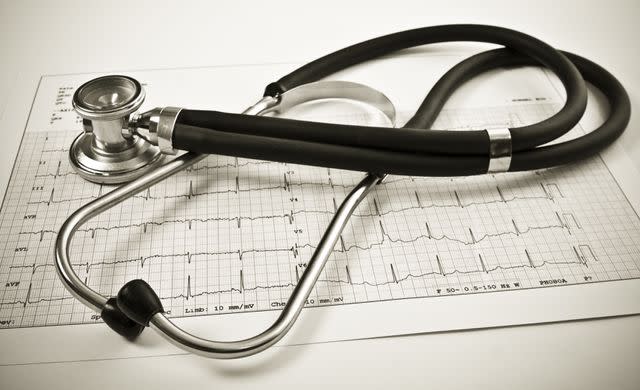LeBron James’ Son Bronny Suffered Cardiac Arrest at 18 — What Young Athletes Should Know About Heart Health
- Oops!Something went wrong.Please try again later.
- Oops!Something went wrong.Please try again later.
Although cardiac arrests are rare in young athletes, experts say preventive screenings can help save lives — along with immediate CPR and fast intervention

Bronny James, the eldest son of NBA star LeBron James, suffered from cardiac arrest on Monday during a basketball workout at the University of Southern California. The 18-year-old is now in stable condition and "no longer" in the ICU, a representative for the James family confirmed to PEOPLE.
As a teenager and a seemingly healthy athlete, Bronny’s health scare sparks conversation surrounding exercise-related cardiac events among youth. Here's what to know about cardiac arrest and its prevalence in young athletes following intense exercise.
Cardiac arrest — also known as sudden cardiac arrest — is the abrupt loss of heart function, resulting from a problem with the heart's electrical system, according to the Mayo Clinic. This disrupts the heart's pumping action and stops blood flow through the body.
It can be fatal if proper steps aren't taken immediately. CPR can improve the chances of survival until emergency medical assistance arrives. More than 356,000 cardiac arrests occur outside a hospital in the United States each year, according to the American Heart Association.
A person suffering a cardiac arrest can experience immediate and drastic symptoms like sudden collapse, no pulse, no breathing, and a loss of consciousness. Warning signs can include chest discomfort, shortness of breath, weakness and a heart palpitations.
Never miss a story — sign up for PEOPLE's free daily newsletter to stay up-to-date on the best of what PEOPLE has to offer, from juicy celebrity news to compelling human interest stories.

Alex Bierens de Haan/Getty
RELATED: LeBron James' Son Bronny, 18, Suffers Cardiac Arrest During USC Basketball Workout
Sudden cardiac arrest is the leading cause of death in young athletes.
According to The Sports Institute, about 1 or 2 in every 100,000 young athletes experience a sudden cardiac arrest each year, with males being at greater risk than females, and African American athletes being at greater risk than their white counterparts.
About 6 in every 100,000 college African American male athletes have a sudden cardiac arrest each year, experts say. The rate is highest among NCAA Division I male basketball players, whose risk is 20 per 100,000 per year.
Experts say that cardiac arrest among young athletes is rare but can occur when an underlying heart condition is present such as cardiomyopathy or arrhythmia.
Cardiomyopathy is a form of heart disease that affects the heart muscle and makes it difficult to pump blood to the rest of the body, according to the American Heart Association. A heart arrhythmia is an irregular heartbeat.
In addition to genetic heart abnormalities, one condition that can also lead to sudden cardiac arrest or death in young athletes is "commotio cordis," which is a fatal disruption of heart rhythm after a blow to the chest wall. Commotio cordis is rare but most common among male athletes participating in sports with projectiles.

Because it can be difficult to tell the difference between arrhythmias and an expected increase in heart rate during exercise, monitoring an athlete's heart patterns and symptoms is vital to their health.
Experts say screening athletes prior to competition or participation is the best approach to identifying existing cardiac pathology that may put an athlete at risk for sudden cardiac arrest. The screening process can include analyzing medical and family history and using an electrocardiography (EKG), which records electrical activity of the heart.
Despite screening, experts say sudden cardiac arrest may still be difficult to predict and therefore prevent among athletes. According to a report from the National Institutes of Health, “adequately trained personnel, education of trainers and bystanders, and access to AEDs [automatic external defibrillator] at a sports venue are crucial in reducing the incidence of sudden cardiac death after an arrest.”
Dr. Xiaoke Liu, a cardiologist with the Mayo Clinic Health System, insists that parents and young athletes should not be deterred from participating in sports, noting that cardiovascular exercises remain beneficial for overall health and are encouraged.
“Sudden death in the young is rare,” he assured. “Measures like early cardiopulmonary resuscitation and automatic external defibrillators are available and effective in preventing sudden cardiac death in case of an emergency.”
For more People news, make sure to sign up for our newsletter!
Read the original article on People.

